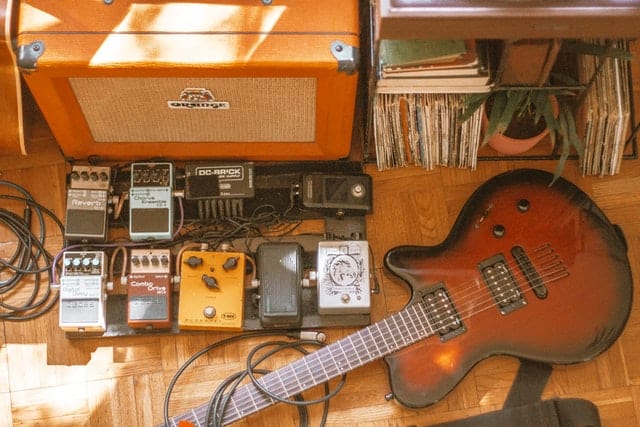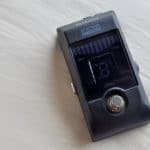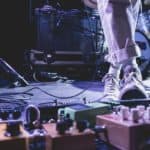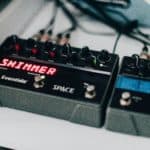A player’s “sound” is quite the topic of discussion.
Some people can get, what they consider to be, a great sound with the simplest of signal chains (a guitar, a cord, and an amp).
However, some people need that little extra something to get the sound that they can’t play without. This is usually attained by a pedal or two which never get turned off.
Always-on pedals range from devices without switches meant to buffer your board, to common pedals that certain players just can’t play without. These pedals also vary widely in how they affect the tone, giving the player that extra “thing” they need to get their sound.
So, let’s dive into this topic and see if this is something you need.
Do always-on guitar pedals have switches?
Certain pedals, like standalone buffers, don’t have switches.
They’re meant to be on all the time so that they can ensure that your signal is strong from one end of your pedal chain to the other.
The TC Electronic Bonafide Buffer is a great example, being a buffer “pedal” for your pedalboard that has no switch; it always stays on.
Most other pedals are just regular pedals that do have bypass switches (pick any pedal here, the options are limitless). How the player wants to use them determines if they come and go, or stay on all the time.
What makes for an always-on guitar pedal?
An “always-on” pedal varies from player to player. They give the player a certain something that they just can’t play without.
Sometimes it’s a preamp-style pedal (such as the Schaffer Replica used by Angus Young of AC/DC) that just adds a bit of fatness to the overall tone.
Sometimes it’s a reverb pedal that stays on all the time because the player digs the sound, or the amp they’re using doesn’t have reverb.
Sometimes it’s a delay that just stays on because the player likes delay on everything.
Sometimes it’s a buffer pedal that makes sure that the guitar’s signal stays strong throughout the signal chain.
How do you use always-on guitar pedals?
You would turn the pedal on and keep it on! Simple as that!
In all seriousness, you would use one because of the way the pedal affects your overall sound, to the point that you really can’t play without one.
They become as crucial to your sound as your guitar, string type, pick, amplifier, etc.
For certain types that don’t have switches (buffers, I’m looking at you!), you would integrate them into your pedalboard at the beginning and/or end of your signal chain.
Some companies make buffer pedals that also act as full I/O solutions for your pedalboard, such as the Goodwood TX Interfacer or Underfacer.
What are some common always-on guitar pedals people use?
One of the most common “always on” pedals are buffers, some of which have a switch (such as the Fender Level Set Buffer), or have no switch and are meant to stay on all the time (such as the TC Electronic Bonafide Buffer).
Some players tend to have an overdrive or boost pedal that stays on all the time because of the way it beefs up their sound or reacts to their playing.
Josh Smith famously has a Lovepedal Tchula pedal on all the time because it’s an integral part of his sound (and if it’s off, it’s only for a short time or specific reason).
If you’re a country player, you may have a compressor pedal that is always on to help give you more spank and twang. Other players may just keep one on for how it lifts their sound.
EQ pedals can also be considered “always-on” pedals if they’re an integral part of how the player shapes the sound. Dimebag Darrell always had an MXR 6-band EQ pedal before his signal hit the amp to help shape the mids and low-end.
Reverb and delay pedals are also commonly used as “always-on” pedals for players who want to keep a sense of space in their sound.
Eric Gales keeps a Sansamp Boost DLA pedal on all the time for a quarter-note delay that he taps in.
A reverb pedal may also stay on if a player wants a particular reverb sound, such as Khruangbin’s Mark Speer’s EHX Holy Grail pedal, or the amp they’re using doesn’t have one built in.
Do you really need an always-on guitar pedal to get a good tone?
This is always the debate. Some players are just fine with the sound they get from their guitar, cable, and amp, while others need that certain something that a pedal provides.
It’s up to the player to decide what is best for them. If you’re good with no pedals, awesome!
Do you need to have that reverb or delay always on to keep you playing, then step on it and play on!

Hello there, my name is Ramiro and I’ve been playing guitar for almost 20 years. I’m obsessed with everything gear-related and I thought it might be worth sharing it. From guitars, pedals, amps, and synths to studio gear and production tips, I hope you find what I post here useful, and I’ll try my best to keep it entertaining also.





